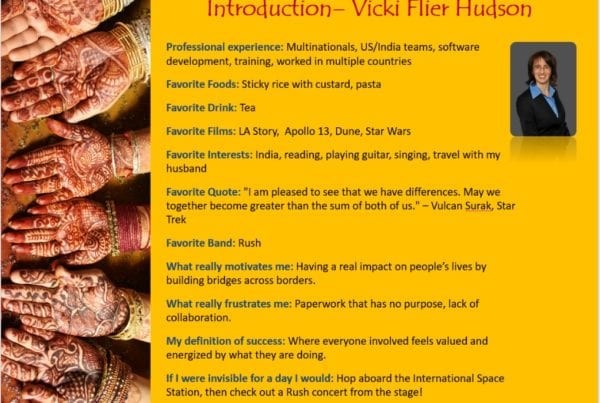These days global business is charact erized by information overload and high demands. More and more, clients tell me that their biggest challenge is overwhelm, and that they simply don’t have the time to develop quality relationships with their colleagues across cultures. I came across something I wrote in 2013 that offered three reminders for cross-cultural success. They may be even more relevant today.
erized by information overload and high demands. More and more, clients tell me that their biggest challenge is overwhelm, and that they simply don’t have the time to develop quality relationships with their colleagues across cultures. I came across something I wrote in 2013 that offered three reminders for cross-cultural success. They may be even more relevant today.
- Take chances.
- Be present.
- Let go of control.
On the surface, working across cultures presents so many barriers. There are the obvious ones like language barriers and time zone differences. Then there are the not-so-obvious ones like fundamental differences in values and managing our own biases.
I invite you to consider how you could implement one of these reminders as early as today.
- Take chances
- Be brave and go sit next to that new Indian colleague who always eats alone in the office cafeteria.
- Ask your German colleague about a cultural behavior that puzzles you; approach them with an attitude of curiosity.
- Take a Chinese colleague up on that invitation to their home, even if you might offend them by making a cultural mistake.
- Ask your American colleague to slow down when they speak; let them know you have difficulty understanding them.
- Tell a colleague from your own culture if an action or behavior of theirs is causing you struggle. Explain the impact of the behavior using “I” statements and ask them for suggestions.
- Be present
- When you attend a global conference call, shut down your e-mail and actively listen.
- Give non-native speakers of your language your full attention even when you are short on time and wish they would speak more quickly.
- Make intentional choices to connect with customers and teammates across cultures; call them when you don’t need to, or find out two new things about them on a personal level.
- Take three deep breaths every day at the same time, no matter where you are.
- Wait for someone to finish speaking completely before you think about how you will respond.
- Let go of control
- When you encounter a frustrating cross-cultural challenge, be willing to engage the ambiguity and say “I don’t know right now.”
- Expect a certain level of discomfort as part of global teamwork and practice being with that discomfort rather than trying to fix it.
- Make a mental boundary between what you can control and what you cannot, then practice responding to situations and opportunities as they arise.
- Remind yourself about the bigger picture goal you are trying to accomplish. Work with people from that context, rather than what can get crossed off your to-do list quickly.
- When someone is not behaving the way you wish they would, accept them as they are and make specific requests that will meet your needs.
Working across cultural boundaries brings challenges, but our own mindset can make the biggest difference. I invite you to choose one thing from this list, or to generate one idea from one of these three categories and try it today. Let us know how it goes! After all, as Neil Armstrong might have said, a small step can be just as powerful as a giant leap.






Excellent reminders. As an immigrant and now a citizen of USA, I have found that the fear of asking is only in our mind. 99% of the time if we were to do what Vicki says, we will be astonished how simple that was. Plus the benefit of creating a lasting relationship….priceless.
Thank you for your perspective, Ashish! I too experienced that fear living abroad. I wouldn’t want to offend and so sometimes I wouldn’t ask. What I found is that if I lived my life with the goal of never offending anyone, I wasn’t taking enough risk to get to know people!